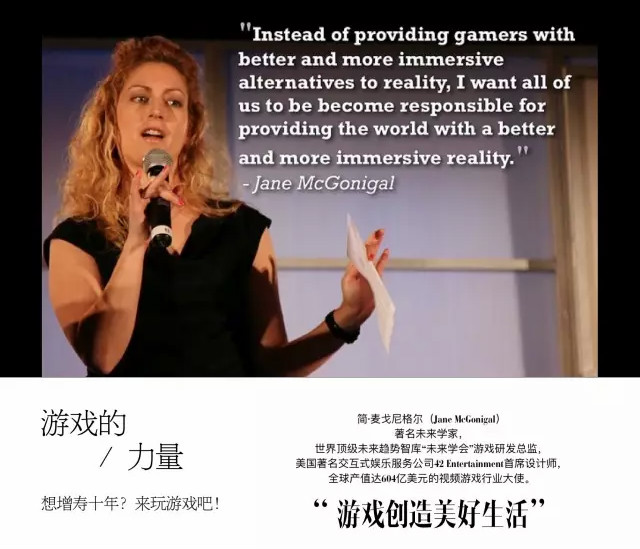I'm a gamer. I'm gonna to try to increase the life span of every single person in this room by seven and a half minutes. Your mission is to figure out how you want to spend your extra seven and a half minutes. In my first TED Talk, I did propose that we should spend 21 billion hours a week, as a planet, playing video games. It's so much time, in fact, that the number one unsolicited comment that I have heard from people all over the world since I gave that talk, is this: Jane, games are great and all, but on your deathbed, are you really gonna to wish you spent more time playing Angry Birds?
我是一名游戲玩家。我要去嘗試將房間內每個人的壽命延長7.5分鐘。你的任務是想一想該如何度過這額外的7.5分鐘。在我的TED演講中,我建議地球上的所有人每周應該玩 210 億小時的游戲。事實上,自那次演講之后,我聽到了來自全世界的批評,其中質疑最多的是:簡,游戲固然很棒,但臨終之時你真打算花更多的時間打憤怒的小鳥嗎?
Hospice workers, the people who take care of us at the end of our lives, recently issued a report on the most frequently expressed regrets that people say when they are literally on their deathbeds. And that's what I want to share with you today—the top five regrets of the dying. Number one: I wish I hadn't worked so hard. Number two: I wish I had stayed in touch with my friends. Number three: I wish I had let myself be happier. Number four: I wish I'd had the courage to express my true self. And number five: I wish I'd lived a life true to my dreams, instead of what others expected of me.
在我們的生命即將結束時會給予我們照料的護工們最近發布了一份關于人們在臨終之時最后悔之事的報告。今天我想跟你們聊聊這個話題—將死之人最后悔的五件事。第一:我后悔不該工作這么拼。第二:我后悔未與朋友保持聯系。第三:我后悔沒讓自己更快樂。第四:我后悔沒有勇氣活出真實的自我。第五:我后悔沒有按照自己的夢想去生活,而是按照別人對我的期望而活。

When I hear these top five regrets of the dying, I can't help but hear five deep human cravings that games actually help us fulfill. For example, I wish I hadn't worked so hard. For many people, this means, I wish I'd spent more time with my family, with my kids when they were growing up. Well, we know that playing games together has tremendous family benefits. A recent study reported that parents who spend more time playing video games with their kids have much stronger real-life relationships with them.
當我聽到將死者說出他們最后悔的這五件事時,我不由得聽到人類發自內心的五個渴望,只有游戲才能幫助我們滿足這些渴望。比如,我后悔不該工作這么拼。對于許多人來說,這意味著,我真希望能多花點時間與家人及成長中的孩子待在一起。那么,我們知道,一家人在一起打游戲其實有巨大的好處。一項最新的研究發現,花較多時間與子女一起打電子游戲的父母與子女之間有更濃厚的真實情感關系。
Recently I did spend three months in bed, wanting to die. Suicidal ideation is quite common with traumatic brain injuries. So I created a role-playing recovery game called Jane the Concussion Slayer. Now the game was that simple: Adopt a secret identity, recruit your allies, battle the bad guys, activate the power-ups. But even with a game so simple, within just a couple days of starting to play, that fog of depression and anxiety went away, even while I was still in pain, I stopped suffering. And soon, I started hearing from people all over the world, they were getting "super better," facing challenges like cancer and chronic pain, depression and Crohn's disease.
最近,我在病床上呆了三個月,真想一死了之。對外傷性腦損傷患者來說,有自殺的意念是很正常的。因此,我設計了一款角色扮演類的康復游戲,取名為“腦震蕩終結者—簡”。其實,這款游戲很簡單:選擇一個神秘身份、招募隊友、與壞人作戰并激活能量。然而,盡管游戲很簡單,僅僅在幾天之內,憂郁、焦慮的陰霾便消失了,即使依然有疼痛感,但是我并不感到痛苦。不久以后,我開始從世界各地得到反饋,聽說有人用“SupperBetter”這款游戲來對抗癌癥、慢性疼痛、憂郁及克羅恩氏病等困難。
Some people get stronger and happier after a traumatic event. The game was helping us experience what scientists call post-traumatic growth. Here are the top five things that people with post-traumatic growth say: "My priorities have changed." "I'm not afraid to do what makes me happy." "I feel closer to my friends and family." "I understand myself better. I know who I really am now." "I have a new sense of meaning and purpose in my life." "I'm better able to focus on my goals and dreams." The top five traits of post-traumatic growth are essentially the direct opposite of the top five regrets of the dying.
一部分人經歷了創傷之后變得更強、更快樂。這款游戲正在幫助我們體驗科學家稱之為創傷后成長的一種感受。下面是具有創傷后成長感受的人們所提到的最多的五件事:“我調整了手頭事務的輕重緩急。”“我敢做所有能令我快樂的事。”“我感覺與朋友和家人更親近了。”“我更了解我自己了。我現在確實知道我究竟是誰了。”“我對自己生活的意義和目的有了新的理解。”“我更能專注于自己的目標和夢想了。”創傷后成長的五方面最主要的特質在本質上正好與將死者的五件最后悔的事相反。
Is there a way to get all the benefits of post-traumatic growth without having to hit your head in the first place? There are four kinds of strength, or resilience that contribute to post-traumatic growth. +1 physical resilience, the number one thing you can do to boost your physical resilience is to not sit still. +1 mental resilience, willpower actually works like a muscle. It gets stronger the more you exercise it. +1 emotional resilience, which means you have the ability to provoke powerful, positive emotions like curiosity or love. +1 social resilience, a great way to boost social resilience is gratitude. Touch is even better.
有什么辦法可使你在不需要經歷頭部創傷的情況下得到創傷后成長的所有好處呢?有四種力量或恢復力有助于創傷后成長。+1 身體恢復力:促進身體恢復力首先要做的事是別坐著不動。+1 精神恢復力:實際上,意志力的工作原理如肌肉一樣。你越鍛煉它,它就變得越強大。+1 情緒恢復力:意味著你有能力激起強大、正面的情感,如好奇心和愛心。+1 社交恢復力:提高社交恢復力的一條有效途徑是懷有感激之心。接觸有更好的效果。
It turns out that people who regularly boost these four types of resilience live 10 years longer than everyone else. And when you get there, more than likely, you will not have any of those top five regrets, because you will have built up the strength and resilience to lead a life truer to your dreams. And with 10 extra years, you might even have enough time to play a few more games.
事實證明,定期對這四種恢復力進行增強的人可比正常人多活10年。當你到了這一步,你肯定不會產生上述五種悔恨感,因為到那時你已經增強了這種力量與恢復力,從而可以按照自己的夢想去生活。有了額外的10年,你甚至會有足夠的時間去打更多的游戲。











